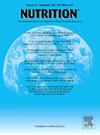对患有短肠综合征和家庭肠外营养依赖的成年稳定期患者进行 48 个月的泰度鲁肽治疗:一项真实世界的意大利单中心观察性队列研究。
IF 3.2
3区 医学
Q2 NUTRITION & DIETETICS
引用次数: 0
摘要
研究目的:本现实生活研究旨在探讨teduglutide (TED)的短期和长期有效性和安全性及其对接受长期肠外支持(PS)的成年稳定型短肠综合征和慢性肠衰竭患者的生活质量(QoL)的影响。患者和方法:对2017年3月至2023年8月期间开始接受TED治疗的个体进行了一项前瞻性单中心研究。结果:10例患者纳入分析,其中TED给药的中位持续时间为48个月(范围12-71)。与短期临床结果相关的数据显示,10名患者中有4名(40%)对TED治疗有早期反应,定义为3个月时PS需求减少约20%。10人中有6人(60%)无反应。与48个月的长期临床结果相关的数据表明,没有晚期应答患者,并强调所有4名早期TED应答患者继续保持持续的PS减少。事实上,4名对TED应答的患者中有2名(50%)停止了PS,而另外2名(50%)患者将每周PS输注次数减少了约50%。有反应的患者生活质量的生理和心理指标均有显著改善(P < 0.05),无反应的患者生活质量无明显变化。在本研究中,对TED治疗反应的可预测性似乎与1)SBS 3型相关,无反应患者完全没有SBS (P < 0.0001), 2)反应患者的残余小肠长度(102±18 cm)显著(P < 0.02)高于无反应患者(67±27 cm), 3) SBS 1型和2型,肠造口,手术并发症显著预测无反应。克罗恩病在应答者和无应答者中同样存在。根据我们的经验,在第3个月(0.01 n°/d/患者)和第48个月(0.001 n°/d/患者)观察到的副作用数量都非常小。在TED治疗的第48个月,没有观察到内镜下的肿瘤病变。结论:这一真实世界的经验使我们能够声明,经过48个月的治疗,TED: 1)是一种安全的疗法,副作用最小,罕见;2)使40%的治疗患者的PS量迅速减少;3)同意20%的入组患者停用PS;4)维持稳定的营养状态,最终5)显著提高生活质量。本文章由计算机程序翻译,如有差异,请以英文原文为准。
Forty-eight months outcomes of teduglutide treatment in adult stable patients with short bowel syndrome and home parenteral nutrition dependence: A real-world Italian single-center observational cohort study
Aim of the study
This real-life study is designed to investigate the short and long-term efficacy and safety of teduglutide (TED) and its effects on the quality of life (QoL) in a cohort of adult, stable patients with short bowel syndrome and chronic intestinal failure receiving long-term parenteral support (PS).
Patient and Methods
A prospective, single-center study was conducted for individuals who began to take TED between March 2017 and August 2023.
Results
Ten patients were included in the analysis, among whom the median duration of TED administration was 48 (range, 12–71) months. Data relative to short-term clinical outcomes demonstrate that 4 of 10 (40%) patients were early responders to TED therapy, defined as a >20% reduction in PS requirement at 3 months. Six of the 10 (60%) were non-responders. Data relative to 48 months long-term clinical outcomes demonstrated the absence of late responder patients and underline that all 4 early TED responder patients continued to maintain a sustained reduction in PS. Indeed, two of the 4 patients (50%) responding to TED discontinued PS while the other 2 patients (50%) reduced the number of weekly PS infusions by approximately 50%. The physical and mental components of the QoL improved significantly (P < 0.05) in responsive patients but did not change in non-responsive ones. Predictability of response to TED therapy in this study seemed to be linked to 1) SBS type 3, which was completely absent in the non-responder patients (P < 0.0001), 2) the residual small bowel length was significantly (P < 0.02) higher in responder (102 ± 18 cm) compared to non-responder patients (67 ± 27 cm), and 3) SBS type 1 and 2, enterostomy, surgical complications are significantly predictive of no response. Crohn's disease is equally present in both responder and non-responder patients. The number of side effects observed in our experience was extremely small both at the 3rd (0.01 n°/d/patients) and at the 48th month (0.001 n°/d/patients). No endoscopic neoplastic lesions were observed up to the 48th month of TED therapy.
Conclusions
This real-world experience allows us to state that, after 48 months of treatment, TED: 1) is a safe therapy with minimal, rare side effects; 2) produces a rapid reduction in PS volumes in 40% of treated patients; 3) consents 20% of enrolled patients to be weaned off PS; 4) maintains a stable nutritional state and, finally, 5) significantly improves the QoL.
求助全文
通过发布文献求助,成功后即可免费获取论文全文。
去求助
来源期刊

Nutrition
医学-营养学
CiteScore
7.80
自引率
2.30%
发文量
300
审稿时长
60 days
期刊介绍:
Nutrition has an open access mirror journal Nutrition: X, sharing the same aims and scope, editorial team, submission system and rigorous peer review.
Founded by Michael M. Meguid in the early 1980''s, Nutrition presents advances in nutrition research and science, informs its readers on new and advancing technologies and data in clinical nutrition practice, encourages the application of outcomes research and meta-analyses to problems in patient-related nutrition; and seeks to help clarify and set the research, policy and practice agenda for nutrition science to enhance human well-being in the years ahead.
 求助内容:
求助内容: 应助结果提醒方式:
应助结果提醒方式:


